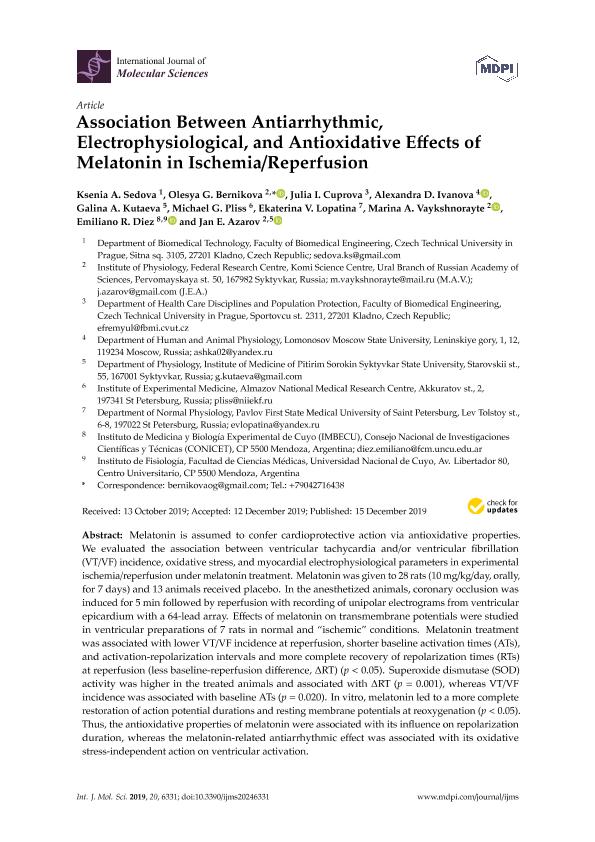Artículo
Association between antiarrhythmic, electrophysiological and antioxidative effects of melatonin in ischemia/reperfusion
Sedova, Ksenia A.; Bernikova, Olesya G.; Cuprova, Julia I.; Ivanova, Alexandra D.; Kutaeva, Galina A.; Pliss, Michael G.; Lopatina, Ekaterina V.; Vaykshnorayte, Marina A.; Diez, Emiliano Raúl ; Azarov, Jan E.
; Azarov, Jan E.
 ; Azarov, Jan E.
; Azarov, Jan E.
Fecha de publicación:
15/12/2019
Editorial:
Molecular Diversity Preservation International
Revista:
International Journal of Molecular Sciences
ISSN:
1661-6596
e-ISSN:
1422-0067
Idioma:
Inglés
Tipo de recurso:
Artículo publicado
Clasificación temática:
Resumen
Melatonin is assumed to confer cardioprotective action via antioxidative properties. We evaluated the association between ventricular tachycardia and/or ventricular fibrillation (VT/VF) incidence, oxidative stress, and myocardial electrophysiological parameters in experimental ischemia/reperfusion under melatonin treatment. Melatonin was given to 28 rats (10 mg/kg/day, orally, for 7 days) and 13 animals received placebo. In the anesthetized animals, coronary occlusion was induced for 5 min followed by reperfusion with recording of unipolar electrograms from ventricular epicardium with a 64-lead array. Effects of melatonin on transmembrane potentials were studied in ventricular preparations of 7 rats in normal and ?ischemic? conditions. Melatonin treatment was associated with lower VT/VF incidence at reperfusion, shorter baseline activation times (ATs), and activation-repolarization intervals and more complete recovery of repolarization times (RTs) at reperfusion (less baseline-reperfusion difference, ΔRT) (p < 0.05). Superoxide dismutase (SOD) activity was higher in the treated animals and associated with ΔRT (p = 0.001), whereas VT/VF incidence was associated with baseline ATs (p = 0.020). In vitro, melatonin led to a more complete restoration of action potential durations and resting membrane potentials at reoxygenation (p < 0.05). Thus, the antioxidative properties of melatonin were associated with its influence on repolarization duration, whereas the melatonin-related antiarrhythmic effect was associated with its oxidative stress-independent action on ventricular activation.
Palabras clave:
MELATONIN
,
ISCHEMIA
,
REPERFUSION
,
ARRHYTHMIA
Archivos asociados
Licencia
Identificadores
Colecciones
Articulos(IMBECU)
Articulos de INST. DE MEDICINA Y BIO. EXP. DE CUYO
Articulos de INST. DE MEDICINA Y BIO. EXP. DE CUYO
Citación
Sedova, Ksenia A.; Bernikova, Olesya G.; Cuprova, Julia I.; Ivanova, Alexandra D.; Kutaeva, Galina A.; et al.; Association between antiarrhythmic, electrophysiological and antioxidative effects of melatonin in ischemia/reperfusion; Molecular Diversity Preservation International; International Journal of Molecular Sciences; 20; 24; 15-12-2019; 1-15
Compartir
Altmétricas



